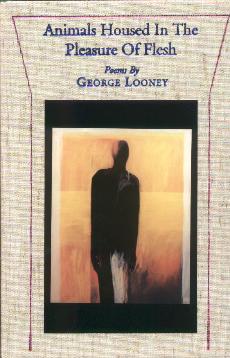The small Founders Gallery was crammed with people. More than 100 students of various descriptions ate free food and cahtted in anticipation. Poetry fans, Theatre Studies majors and regular students there to get extra credit all commingled, waiting for the evening’s reading to begin. George Looney, award-winning poet, Chair of Pennsylvania State Erie’s creative writing program, and Editor of the national literary journal Lake Effect presented an hour of his poetry on April 5 with a performance that reached everyone in the room.
The crowd grew quiet. Professional tutor and poet Douglas Smith introduced Looney with effusive praise. They met in 1982 and have been friends ever since.
“I have been reading George Looney’s poetry with great pleasure for almost a quarter of a century,” Smith said, “and I was happy he could bring his poems to Guilford College.”
Looney is a big man, tall and heavy-set, with a thick beard and a self-deprecating manner. When he got to the podium, he stood for a moment with his eyes down, then introduced himself briefly and got down to the serious business of poetry.
He doesn’t read poetry the way most other poets do. Where they tiptoe, he parades; where they lie in quiet dells, he erects cathedrals. His religious upbringing comes across to the audience in his choice of words and phrases.
“It had some of the bombastic sound of scripture reading, like when I grew up catholic and people would read the Bible: a sense of ‘thus sayeth the Lord’ after each poem,” said David Bowen, Instructor in English.
Looney read from his books “Attendant Ghosts,” “Animals Housed in the Pleasure of Flesh,” and his newest, “The Precarious Rhetoric of Angels.” His work showed an amazing and precise grasp of the English language. The audience was enthralled by it, and by the time he began answering questions he’d won converts throughout the room.
“He was charismatic and fascinating, and an excellent performer,” said sophomore Jordan Spoon.
It’s difficult to give examples of both the sense of majesty and the wealth of detail that Looney’s words provide. For the first, consider this excerpt from his piece “Figures We’re Meant to Believe In,” which embodies his sense of grand metaphor:
A sad replica of a saint or demon
Carved from stone and bolted down in a cathedral to balance the remarkable
Light passing through figures
We’re meant to believe in
Consider this poem, “Music Left by Another,” where Looney writes of desert geckos and their lives:
The gecko
Ritualizes concentration. When
Its feet listen, nothing else is real. Some say it has
Only survived because insects
Worship it, sacrificing
Themselves in its entranced mouth.
His work combines sacred heights with everyday worlds.
After the reading, Looney held a short question-and-answer session. He spoke with the enthusiastic crowd about being a poet and his own process of growth.
Looney was charismatic: “I got into poetry for the money and women. I was misinformed.” He was heartfelt and honest about the difficulties of being a professional writer, but the benefits, he said, were amazing. He stayed in the Founders Gallery and signed books for some time, and then left for parts unknown.
I love it when students can hear different voices,” Smith said of the audience’s reaction. “[They] enjoyed his discussion of aesthetic issues at the end of the reading.”
This reading was part of Smith’s ongoing efforts to get nationally-known poets and writers to speak at Guilford, and he hopes to continue his success next year with more speakers as talented as Looney.

